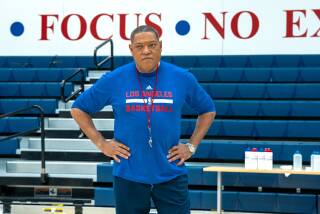Capitals Have Yet to Learn
NEW YORK — In “The Hustler,” perhaps the best American movie about games, one line has the coldest wind-chill factor of all. When you hear it the first time, you shiver, because you’re sure it’s true, but you don’t quite know why.
In the midst of a marathon high-stakes pool game, Paul Newman’s character, Fast Eddie Felson, tells Minnesota Fats, “You’re good, Fats, but I’m the best. Even if I lose, I’m still the best.”
The camera cuts to George C. Scott, who is nominally Fats’ manager, but is really the movie’s symbol of the world, the flesh and the devil. His ears twitch. He’s heard a telltale clue. But what?
“Stay with this kid,” says Scott to Fats. “He’s a loser.”
Newman looks at Scott, fascinated and mystified. What has he said?
Now, let’s go to the dressing room of the Washington Capitals, a team that, for the last three years, has been among the elite of professional hockey in terms of regular-season victories. And a team that, in the words of Bob Carpenter, “doesn’t have a thing in our pockets to show for it.”
In a stunning and almost unaccountable upset, the Capitals were beaten, 2-1, last Sunday night and sent home for the summer by the New York Rangers, a team of limited skill and many injuries. This is how the Capitals still saw the six-game disaster:
“Deep in my heart, and I think deep in the heart of everybody in this dressing room, we think we’re the better team,” said Craig Laughlin, who, seconds after the final horn, smashed his stick repeatedly on the goal bar until it was reduced to splinters. “They made the most of the few breaks we gave them. We couldn’t capitalize on their 65,000 mistakes.”
“Every one of their wins was a surprise,” said Carpenter. “We didn’t expect them to win any game . . . I think we’re a much better team in every aspect of the game . . . I think we really pressed. We shot the puck right into (John) Vanbiesbrouck’s pads 25 times. If this were a regular season game, with all the chances we had tonight, we’d probably have won by a touchdown (seven goals).”
“Maybe we still feel that we’re the better hockey team,” said Mike Gartner. “Maybe that’s being stupid and hard-headed on our part, but that’s just the way it is.”
Say hello to 21 Fast Eddies.
Now gather ‘round and hear this: If you lose, you aren’t better.
And as long as you keep saying you are--that is, pretending that you are--you only perpetuate your problems.
The Always-Say-Taps Caps have to learn two of the toughest lessons in sports. In the harsh realm of games for cash and glory, talent isn’t the same as performance. And hard work isn’t the same as character.
As people, the Capitals are as diligent and admirable a group of athletes as you could find. They’re disciplined, brave, fiercely conditioned and say, “Excuse me, sir,” when you invade their locker room and stomp on their shoes. As a group, you’d want to bring ‘em home to momma or have them as friends.
Also, the Capitals have all the talent and all the work-ethic values necessary for jock success. But that’s not enough.
No teams uses the word “character” more than the Capitals, who intone it like a mantra. They think it means they are always on time, or bounce their kids on their knee, or never quit when behind or “take the body” and “muck in the corners.”
In other words, they don’t have a clue. None of that has anything to do with the narrow sliver of the word character that playoff pressure measures.
Grace under pressure is closer to what’s at issue here. It’s the ability to relax and perform naturally for the biggest stakes. Having or acquiring that gift doesn’t make you a wonderful person.
But it may keep you from losing to the Rangers in six.
“When you start to press in hockey, nothing right happens,” said Ranger Bob Brooke. “Here you are on skates on ice with a tiny puck and a curved stick and some big guy about to deck you. I’ve had pro football players ask me, ‘How the heck do you do it?’
“Well, as soon as you get just a little tight, you can’t do any of it. You shoot it wide, high, into the pads. The plays break down. The mistakes creep in,” said Brooke. “That’s why it’s been such a help to us to be underdogs. We’re relaxed.”
As Pierre Larouche, who scored both Ranger goals, put it, “Right now, I still don’t think the team realizes what it did.”
When it’s pressure time--that is, time to start pressing and messing yourself up--nothing plays on your mind like the presence of a hot goalie on the other team. “Goaltending outdoes everything,” said Larouche.
“Going through a lot of the Caps’ minds is Johnny Vanbiesbrouck,” said Brooke.
In a sense, Vanbiesbrouck is just an outward sign of the Capitals inability to perform under playoff pressure as they do routinely in the regular season when talent is the measure of everything.
“We weren’t natural and smooth when we had our chances,” said Carpenter. “We were so anxious not to waste our opportunities that we just tried to make sure we shot it on goal, so we shot it right into him instead of having it go to the corners.”
This series followed a mischievous scenario which helped lull the Capitals into their We’re Better Syndrome. An 8-1 slaughter in Game 2, followed by a 6-1 lead in Game 3 was intoxicating. “Young people get caught up in a situation,” said Capitals’ Coach Bryan Murray. “(At that point) we knew we were the best team . . . (pause) . . . Now that they’ve beaten us, they’re the best team. But, then, we knew we were.”
“It got to the point where we’d let it slip so far that we couldn’t get a grip on it,” said Gartner of the undertow sensation that a team feels when events have suddenly begun to control them rather than visa versa. Ask the 1985 St. Louis Cardinals, who also spent their off-season moaning about how they were the better team.
Back in the Capitals’ locker room, Mike Gartner was turning the problem over and over in his mind. Three years of regular-season success and nothing to show for it--not one banner of any sort for the Capital Centre roof.
Gartner has seen “The Hustler.” He knows the scene. How do you escape the Fast Eddie predicament of copping out in the clutch by saying, “Even if I lose, I’m still the best.”
“Maybe you get out of it,” said Gartner, “by somebody putting you in your place.”
More to Read
Go beyond the scoreboard
Get the latest on L.A.'s teams in the daily Sports Report newsletter.
You may occasionally receive promotional content from the Los Angeles Times.






